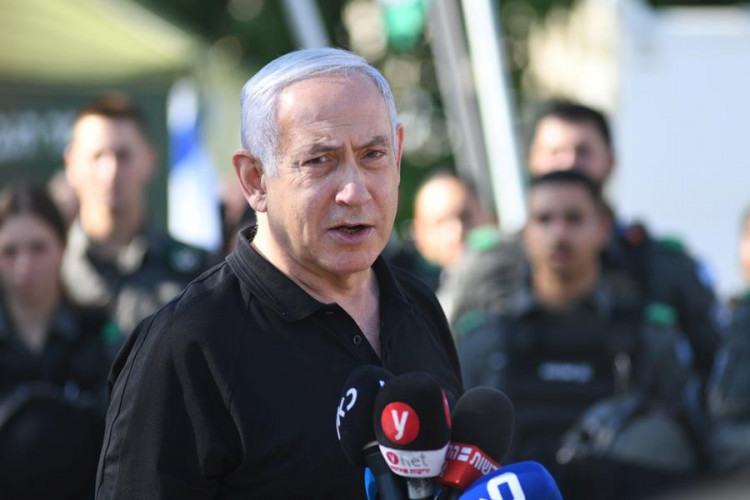Israeli Prime Minister Benjamin Netanyahu dismissed Defense Minister Yoav Gallant on Tuesday after months of public disputes over Israel's military and political direction, igniting protests and sparking concern about the nation's stability amid ongoing war tensions. Netanyahu's decision to remove Gallant, a former military general, underscores deep divisions within the Israeli government over military strategy and domestic policies, especially concerning Israel's judicial reforms and ultra-Orthodox military exemptions.
In a recorded statement, Netanyahu attributed the decision to "a breakdown of trust" with Gallant, saying their rift had become apparent to Israel's adversaries. "The trust between me and the minister of defense has cracked," Netanyahu said, adding that he "made many attempts" to reconcile with Gallant but ultimately determined that their differences could jeopardize Israel's security.
The move has alarmed political figures and citizens alike. Within hours of the announcement, opposition leader Yair Lapid condemned the firing as "an act of madness" that prioritizes Netanyahu's political survival over national security. In Tel Aviv and Jerusalem, protestors flooded the streets, calling Netanyahu's decision reckless, especially as Israel faces multiple security threats from Hamas and Hezbollah and heightened tensions with Iran.
Gallant's exit comes at a challenging time for Israel's defense strategy. In recent weeks, the defense minister openly disagreed with Netanyahu's approach to ongoing hostilities with Hamas, as well as his prioritization of controlling the Gaza-Egypt border over securing a hostage deal. Gallant criticized Netanyahu's insistence on "absolute victory" in Gaza as "nonsense" and pushed for greater efforts to achieve a ceasefire and secure the release of hostages held by Hamas, a stance that clashed with the Prime Minister's hardline allies.
Political analysts suggest that Gallant's dismissal is likely to further strain Netanyahu's already fragile coalition, which includes ultra-Orthodox parties and far-right factions opposed to any concessions to Gaza. The Prime Minister's choice to replace Gallant with Foreign Minister Israel Katz-a Netanyahu loyalist without extensive military experience-is seen by critics as a move to tighten control over his coalition amid mounting pressure to enact policies favorable to his far-right allies.
Gallant's firing also has implications for Israel's international relations, particularly with the United States. As one of Israel's key liaisons with Washington, Gallant maintained close communication with U.S. Defense Secretary Lloyd Austin and played a significant role in coordinating Israel's defense strategies with American forces in the region. His removal is likely to raise concerns in Washington, where officials have been monitoring the political discord in Israel as it faces complex security challenges.
The U.S.-Israel partnership has grown increasingly critical as both countries brace for possible aggression from Iran, which Israeli intelligence believes is preparing a third retaliatory attack. The Defense Ministry's reshuffle and Gallant's strong ties with the U.S. defense establishment add uncertainty to how Israel's military and diplomatic stance may shift in the coming weeks.
Israel's internal divisions became increasingly public after Netanyahu announced plans to overhaul the judiciary in 2023. Gallant was the first senior government official to break ranks over the reform, warning that the proposed legislation could fracture Israel's military unity and undermine national security. "The deepening split is seeping into the military and security agencies," Gallant warned in March, a stance that briefly put his job at risk earlier in the year.
The strained relationship between Netanyahu and Gallant has been an open secret in Israeli politics, particularly over Gallant's stance on ultra-Orthodox conscription. As a long-time advocate of equal service, Gallant has pushed for the inclusion of ultra-Orthodox Israelis in military service, a position that angered Netanyahu's ultra-Orthodox coalition partners who insist on continued exemptions. Last week, Netanyahu was forced to back down on a bill to secure daycare subsidies for ultra-Orthodox families unless fathers serve in the Israel Defense Forces-a rare concession Gallant openly supported.
The reshuffle is expected to shift the political landscape within Netanyahu's coalition. By appointing Gideon Sa'ar as foreign minister, Netanyahu aims to shore up the coalition's stability, particularly with ultra-Orthodox factions. The Prime Minister described the appointments as a measure to "enhance the stability of the coalition and the stability of the government," a critical objective amid Israel's ongoing conflict.
Meanwhile, Gallant's calls for an investigation into the October 7 Hamas attack have added another layer of controversy. The defense minister had publicly pushed for a state inquiry into the military and intelligence failures that enabled the deadly assault by Hamas. Some critics suggest that Netanyahu's decision to remove Gallant was influenced by these calls, given the potential impact of such an inquiry on Netanyahu's leadership.
Beyond the war and security issues, Netanyahu's administration is also facing scrutiny in a criminal investigation related to national security leaks. Last month, a judge partially lifted a gag order in an inquiry involving a top Netanyahu aide, who allegedly leaked classified intelligence to foreign media in a move that reportedly served Netanyahu's interests. Details of a second investigation involving "criminal incidents" connected to the Prime Minister's office since the onset of the war have also emerged, adding further complications to the political crisis.






